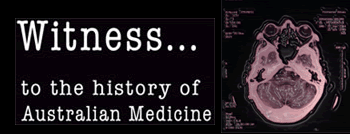


A chapter in the evolution of paediatrics in Australia
Introduction
Participants
Origins of the Department
Early developments
Leadership
New directions in patient care, research and teaching
Ethical issues in research and treatment
Formalising the research effort
Training Programs
Surgical research and training
Finding funds for research
Establishing sub-specialty departments
More on medical education
Academic outreach
Endnotes
Index
Search
Help
Contact us

Ann Westmore: That raises the question, Winston, of the nature of the relationship between those allied health professional groups and the University Department of Paediatrics.
Winston Rickards: It was an interesting relationship. On the one hand participating in the Paediatric program we tried to expose Paediatric trainees to this multi-disciplinary team and to understand the importance of Child Psychiatry. On the other hand, the University Department of Psychiatry needed more and more of my time and sought opportunities to expose students and trainees through sessions and lectures in Child Psychiatry. This [University] Department was necessarily concerned with adult psychiatry because major psychiatric problems were pressing and more apparent in adulthood.
Glenn Bowes: Roger [Hall] talked earlier about the relationship between dentistry and paediatrics, which has continued on. During either David's or Peter’s era - I’m not sure which era it was when Bob Adler[107] came - the beginning of that relationship between academic psychiatry in the University of Melbourne and academic paediatrics really began.
Peter Phelan: That was during my era. There had been a formal review of the Department of Psychiatry in about 1983 and one of the recommendations which Winston strongly supported was that there should be a Professor/Director of Child Psychiatry. I think that was probably in about 1984 or '85, Winston?
Winston Rickards: Yes, 1985. The thing was how much was the appointee to work in psychiatry, and how much in paediatrics.
Ann Westmore: And how was that resolved?
Peter Phelan: There's an important principle here. The University Department [of Paediatrics] was not a Department of Paediatric Medicine. It’s unusual in the University of Melbourne Medical School that paediatrics is responsible for the teaching of all of child health and illness so it covers paediatric medicine, paediatric surgery, child psychiatry, community paediatrics, adolescent health, whereas it’s not a Department of Medicine. I think that’s been one of its great strengths. So, we’ve had a holistic approach - to some extent the Vernon Collins idea.
Durham Smith: I don't think you can separate paediatric medicine and paediatric surgery. I think all the great paediatric surgeons have been much better at teaching than many physicians. And the working relationships have been extraordinarily close.
Peter Phelan: So that tradition that paediatrics encompassed all illnesses at the Children's was very easy to build on. But psychiatrists also wanted a finger in the pie. So it seemed appropriate that the Professor/Director of Child Psychiatry got an appointment in both. But at no stage did any adult department of surgery or psychiatry ever come to me and say, "We want a share in the paediatric surgery or psychiatry".
I think one of the tragedies in the adult hospitals is that the teaching of medicine, surgery and psychiatry is not integrated. They are still taught as distinct disciplines. I raised this issue a number of times recently and people just laughed. I said it's happened since day one in paediatric teaching.
Bernard Neal: At long last the adult medical world is starting to learn a little bit from the paediatric medical world. Whereas when we started, it was the other way around.
David McCredie: Max [Robinson] and I were just saying to one another over lunch, that one of the best paediatricians in the Hospital was Nate Myers.[108] We all very much respected Nate's opinions and when we’d refer a patient to him we’d often be quite embarrassed by his medical summary of the case.
 |
Witness to the History of Australian Medicine |  |
© The University of Melbourne 2005-16
Published by eScholarship Research Centre, using the Web Academic Resource Publisher
http://witness.esrc.unimelb.edu.au/028.html